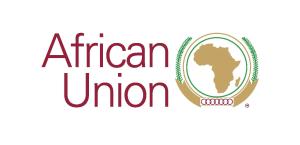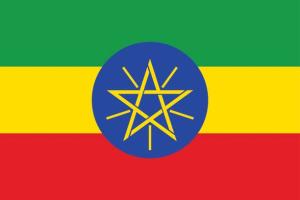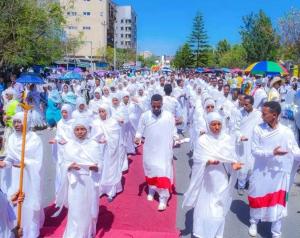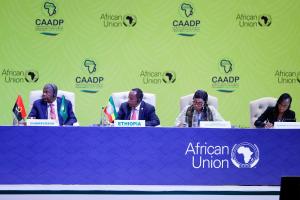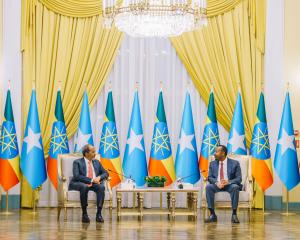Feature - ENA English
Feature Article
East Africa Art and Culture Festival Set to Take Place in Addis This Week
Mar 18, 2025 2616
Addis Ababa, March 18, 2025 (ENA)—The second edition of the East Africa Art and Culture Festival that anticipates bringing together nine countries will take place in Addis Ababa from March 20 to 24, 2025. The event aims to showcase the rich cultural diversity and artistic heritage of East African nations while fostering regional unity and cooperation. During a press briefing today, Culture and Sport State Minister Nafisa Al-Mahdi said the event is a platform for East African countries to present their cultural and artistic works, strengthen diplomatic ties, and enhance regional integration. It is an opportunity to celebrate our shared heritage and build stronger people-to-people connections, she added. The festival will feature a wide array of activities, including conferences, symposiums, cultural and artistic exhibitions, circus performances, traditional cuisines, fashion shows, music, film, and theater as well as book fairs. The event is designed to highlight the unique cultural identities of participating nations. Participants from Burundi, Uganda, Rwanda, Djibouti, South Sudan, Somalia, the Democratic Republic of Congo, Tanzania, and Kenya are expected to attend the festival. “The festival will serve as a bridge for cultural diplomacy and regional cooperation. It will create a conducive environment for artists, cultural producers, and service providers to exhibit and market their works, contributing to economic growth and cultural exchange,” the state minister said. Ethiopia, as the host nation, will use the occasion to showcase its rich cultural heritage, history, and artistic creativity to the world, Nafisa stated, adding that “Ethiopia’s diverse ethnic and cultural fabric, along with its vibrant artistic innovations, will be on full display." The event under the theme "Art and Culture for Regional Integration" will bring together regional and city administrations, cultural institutions, and stakeholders from across East Africa. According to the state minister, the festival is expected to strengthen brotherhood and sisterhood among nations, facilitate knowledge exchange, and create a conducive environment for cultural diplomacy. Preparations for the four-day event have been finalized, with organizers ensuring a seamless experience for participants and attendees. According to Nafisa, the festival is not just a celebration of art and culture but also a platform to draw global attention to East Africa’s cultural richness and foster stronger ties among the nations.
Amadou Hott engages with Ethiopia’s leading entrepreneurs on the sidelines of the African Union Heads of State Summit.
Mar 11, 2025 3136
Unlocking Africa’s potential: Amadou Hott engages with Ethiopia’s leading entrepreneurs Addis Ababa, March 11, 2025 (ENA) ---- As Africa experiences rapid economic change, entrepreneurship and innovation are critical to driving sustainable growth. During the African Union Heads of State Summit, Amadou Hott, former Minister of Economy, Planning, and Cooperation of Senegal and candidate for the African Development Bank (AfDB) presidency, met with Ethiopia's leading entrepreneurs. Innovators who are redefining industries, creating jobs, and contributing to inclusive development. In 2024, global venture capital (VC) funding experienced significant shifts across various regions. North America remained dominant, accounting for 61 percent of global funding with 41 billion USD invested in 2024. Asia secured 13 billion USD , while Europe reached nearly 16 billion USD. In stark contrast, Africa's VC funding remains the smallest among all regions and has faced a sharp decline. The continent's total VC funding dropped to just 2 billion USD in 2024, a 25 percent decrease from 2023 and a 53 percent drop from its peak in 2022. Ethiopia's venture capital landscape is however gradually developing with several initiatives aimed at fostering growth in its startup ecosystem. In 2024, Ethiopia launched weVenture, its first VC-backed incubator, focused on scaling early-stage startups in sectors like fintech, health, and agriculture. Additionally, the country introduced the 100 million USD Enterprise Financing Facility (EFF), which seeks to improve access to capital for small and medium-sized enterprises (SMEs). Ethiopia is emerging as an important player in Africa’s entrepreneurial landscape. Local startups are using technology and innovative solutions to address the continent’s challenges. In his discussions with the entrepreneurs in Ethiopia, Hott met with influential entrepreneurs such as Abrhame Endrias CEO of Lersha App, a digital platform transforming the agricultural sector by providing smallholder farmers with access to mechanized farming services, quality inputs, and advisory support, Vince Mountaga Diop, CEO of BelCash Technology Solutions PLC, a fintech company driving financial inclusion through digital banking solutions, enabling individuals and businesses to seamlessly access mobile banking and payment services, Amadou አማዱ Daffe CEO of Gebeya Inc., a talent marketplace and EdTech platform that connects African tech professionals with global job opportunities, helping to bridge the skills gap in the digital economy and Samrawit Fikru CEO of RIDE Ethiopia, a pioneering ride-hailing service that provides safe, reliable, and affordable transportation while creating economic opportunities for drivers. These innovators are building successful businesses and reshaping Africa’s economic landscape through digital solutions that enhance financial access, transportation, agriculture, and commerce. A strong advocate for youth entrepreneurship stressed the need for better policies, tools, and support systems to unlock Africa’s entrepreneurial potential. “The time for action is now,” he said. “Africa’s future will be shaped by those who dare to innovate and build.” His visit underscored the importance of public-private collaboration in creating an environment where African entrepreneurs can thrive, scale, and attract investment. As Hott’s candidacy for the AfDB presidency progresses, his mission remains clear: to promote infrastructure development, financial inclusion, and regional economic integration. His discussions with Ethiopian entrepreneurs reflect a shared vision for Africa; self-sufficient, globally competitive, and powered by its innovators. Focusing on digital transformation, strategic partnerships, and youth empowerment, Hott aims to nurture the next generation of African entrepreneurs, driving sustainable growth from within.
SkyWin Aeronautics Industries— A Testament in Ethiopia’s Defense Modernization
Mar 9, 2025 3407
Addis Ababa, March 9, 2025 (ENA)—This weekend, Prime Minister Abiy Ahmed inaugurated SkyWin Aeronautics Industries, a company that manufactures unmanned aerial vehiclesfor both civilian and military use. As part of its far-reaching reform in the defense sphere, Ethiopia is witnessing tremendous advancements in terms of defense manufacturing. Particularly, the launch of SkyWin Aeronautics Industries has marked a transformative shift in its military and strategic landscape. This industry is part of Ethiopia’s broader efforts to achieve technological self-reliance in the security sector. Ethiopia has developed the capacity not only to produce and utilize drones but also to export them, the Prime Minister announced on the inaugural ceremony. “Today, as we inaugurate Sky Win Aeronautics Industries, we recognize that the locally manufactured drones before us were unimaginable just a few years ago,” the Prime Minister wrote on X. Beyond technological achievement, this development is a bold assertion of Ethiopia’s commitment to self-sufficiency, deterrence, and strategic autonomy. In a region historically shaped by external militarization, foreign interventions, and shifting alliances, the ability to design and produce advanced defense systems signals Ethiopia’s intent to secure its national interests on its own terms. Prime Minister Abiy elaborated that our ability to produce drones with diverse capabilities—designed and built by our own young professionals—is a significant milestone. He added that to sustain this progress, we must invest in continuous research, expand our market reach, and strengthen local production of smart sensor technologies. “We are developing capabilities like these—along with the advancements at Homicho Ammunition Engineering Industry—not to fuel conflict, but to prevent it. Through deterrence, we seek to secure peace and stability in the face of belligerent actors” the Prime Minister underscored.
Africa’s Rising Demand for Sustainable Investment
Mar 8, 2025 1885
Addis Ababa, March 8, 2025 (ENA) --Africa, rich in critical energy minerals like lithium, cobalt, and rare earth elements, offers transformative investment opportunities as the world shifts towards a clean energy transition. The continent holds about 30 percent of the world’s critical mineral reserves including 55 percent of global cobalt and 47.65 percent of manganese. The continent is also rich in natural graphite, copper, nickel, lithium, and iron ore. These minerals are essential for the production of batteries, fuel cells and other components used in electric vehicles (EVs), renewable energy technologies, medical supplies, and high-performance metals and engines, including those used for defense and military applications. Africa’s vast mineral wealth places Africa as a competitive hub for green technology advancement. According to the 2024 Global Critical Minerals Market Review by the International Energy Agency (IEA), investment in critical mineral mining grew by 10 percent in 2023, with lithium investment rising sharply by 60 percent despite weak prices. This growth shows the strategic approach many mineral rich countries are adopting for development. While the African Union is yet to announce a formal strategy on critical minerals, the African Minerals Development Centre (ADMC) is developing an African Green Minerals Strategy which aims to guide African countries on how to exploit their raw materials. However, Africa hasn't reached its full potential as it is estimated that African countries generate about 40 percent of the revenue it could from these resources. To reach its full potential and meet international quality standards, Africa needs to focus on expanding investment opportunities. Attracting foreign investment for these minerals begins with strengthening internal efforts - modernizing mining operations by upgrading equipment, and prioritizing high-value production such as refining battery-grade lithium instead of exporting raw materials. For economic growth, on-site mineral processing is crucial as it increases export revenues and creates jobs across the supply chain. Investing in STEM education at universities and research institutions is equally important; it fosters innovation, supports knowledge transfer and encourages industry partnerships with mining companies. Ensuring global competitiveness also requires strengthening infrastructure like roads, rail, and ports which evidently boosts supply chain efficiency and elevates Africa’s attractiveness to global investors. Additionally, regional trade and economic integration through agreements such as the African Continental Free Trade Area (AfCFTA) which represents a market of 1.4 billion people and a GDP of over 3.4 trillion USD can facilitate intra-African trade in minerals and technology, reducing dependence on external markets and fostering industrial growth. Further, by investing in modern logistics, streamlined regulations, and efficient cross-border trade policies, African nations have a great chance at maximizing the value of their mineral resources. In order to tap the potential of mining in Africa governments must give a great deal of attention to the sector in terms of policies developing national strategies tailored to their distinctive mineral resources and industrial capabilities. Governments must implement policies that promote investment in mineral processing while these fair labor practices and environmental protection are in place. Even engaging the African diaspora, many who have expertise in engineering, technology, and business, could help facilitate knowledge transfer, industry partnerships, and economic collaboration. Africa stands at a critical time with its vast reserves of minerals with the continent having great potential to drive economic growth, create jobs, and secure future wealth for its countries. However, realizing this potential requires more than just resource extraction – it demands strategic investment, regional cooperation, and a commitment to ethical and sustainable mining practices. The path forward is clear: with the right policies, investments, and international partnerships, Africa can not only meet the world’s growing demand for critical minerals but also shape a future that is prosperous for the continent.
Addis Int’l Convention Center: New Impetus to Ethiopia’s Emerging MICE Industry
Mar 8, 2025 1355
Addis Ababa, March 8, 2025 (ENA)—In the momentous event, Ethiopia’s newly built Addis International Convention Center (AICC) was inaugurated last weekend in the Presence of Prime Minister Abiy Ahmed and high-level Ethiopian and foreign dignitaries. The completion of the center has been truly making Addis Ababa, ideal for global events. The Center is the latest addition to the country’s ongoing efforts to strengthen the MICE sector. Addis Ababa, considered as a political capital of Africa, has now completed the construction of the Center, the first and largest world-class convention and exhibition hub in Ethiopia. The Center is much anticipated to elevate the city’s status as a premier destination for global conferences and exhibitions. As the first, largest, and internationally standardized facility of its kind in the country, this world-class convention and exhibition center can accommodate major regional and international events. Addressing the inaugural ceremony of this world-class venue, Prime Minister Abiy Ahmed underscored that the Convention Center plays a crucial role in attracting international events. He further revealed that the Center has become instrumental in fostering business tourism, and positioning the East African nation as a premier destination for global gatherings. “It (the center) will serve us a trade venue and we exchange ideas as well as do diplomacy in this center. Major events that connect Africa will take place here. For example, in the forthcoming few months, the World AI Conference and Exhibition will be hosted here. Many ideas and knowledge will be exchanged. Since this Center will remain open to Ethiopians for the next 10 days starting today, I would like to invite young people and students to come and see this treasure and exchange ideas that express Ethiopia's aspirations,” the Premier underscored. The Convention Center is situated on 40 hectares of land and features two large halls, each with a capacity to accommodate 3,000 to 4,000 people. The center also includes 8 small and medium meeting halls, accommodating a total of up to 10,000 people and offers two hotels with a combined capacity of 1,000 beds. Addis International Convention Center is designed to meet international standards and accommodate a diverse range of events. The center will also house four large exhibition pavilions that are engineered for flexibility, allowing for easy division and combination to serve multiple events simultaneously. Equipped with state-of-the-art venue facilities, the convention center is expected to be a prime location for large-scale exhibitions, trade fairs, and international conferences. Essentially, Ethiopia is embarking on a massive homegrown development, relying on its own capacity and development model, Prime Minister Abiy said. He further added the country has now been witnessing tremendous successes as result of its sound development policy approach. To this effect, PM Abiy referenced the comments from the 38th African Union Summit participants, which the event was held during last month February 15th and 16th 2025. According to him, those leaders from the rest of the continent and other attendees lauded Ethiopia’s incredible development trajectory and success stories, particularly the ongoing Addis Ababa corridor development. “At the recent African Union Summit, representatives from North, South, East, West, and Central Africa unanimously acknowledged that Ethiopia is shaping its own path and contributing to the broader vision of Africa in a remarkably short period of time.” For the Premier, the Addis International Convention Center is a testament for Ethiopia’s aspiration to realize all-round prosperity in this historical African nation. Prime Minister Abiy farther stated that the progress that has been made in the capital Addis Ababa through corridor development is being reinforced across many major cities of Ethiopia. “Now is the time for prosperity and success. The desire of the government and the people is to prosper, change, and progress. With the right timing and policies in place, we have an opportunity to ensure that our children do not inherit the burden of unjust debt. I urge the Ethiopian public to stand together, to prosper Ethiopia, to bring peace to our nation, and to serve as an inspiration of hope for our fellow Africans.” On her part, Addis Ababa City Administration Mayor Adanech Abebie echoed the same sentiment about Addis International Convention Center which is set to unlock significant trade and tourism opportunities for Ethiopia and the entire African continent at large. From the outset of the far-reaching reforms, the mayor stated that Addis Ababa has been continuously carrying out massive infrastructure development activities based on the leadership and direction of Prime Minister Abiy Ahmed. For her, those development projects are increasingly transforming Addis into an exciting hub of continental and international diplomacy. Evidently, the transformative endeavor in Addis Ababa is sustainable, rapid, and continuous, according to Adanech. She further highlighted the projects in the capital such as the Adwa Victory Memorial, ‘Lenegewa’ Women’s Rehabilitation and Skill Development Center and other various projects that have been achieved over the last year alone. Above all, the newly built Addis International Convention Center will elevate the competitiveness of the city and Africa to a higher level, the Mayor emphasized. Apart from Ethiopia, the convention will unlock lots of opportunities for Africa to forge regional trade integration, attract tourists and foster image building endeavors, she added. Recently interviewed by Press Secretary for the Office of the Prime Minister, Billene Seyoum on Ethiopia in Focus social media platform, Tourism Minister Selamwit Kassa said the newly constructed Convention Center is going to change the game for, for, for Ethiopia in the MICE industry. According to Minister Selamawit, Ethiopia is emerging as an important MICE and conference tourism hub, pointing out that the capital Addis Ababa has hosted more than 40 International, continental and regional conferences over the past 3 or 4 months alone. All in all, the Addis International Convention Center is highly anticipated to significantly boost Ethiopia’s position in the global event-hosting market. By attracting international conferences and exhibitions, the center will drive tourism, create new business opportunities, and provide a platform for local industries to showcase their products and services. It will also play a crucial role in fostering economic growth, offering a venue that can accommodate both public and private sector events, thereby attracting investors, businesses, and entrepreneurs from around the world.
Analysing AfCFTA : Progress and Hurdles Ahead
Mar 5, 2025 1340
Addis Ababa, March 5, 2025 (POA) --- The African Continental Free Trade Area (AfCFTA) was created to promote economic unity among African nations. Officially introduced on March 21, 2018, in Kigali, Rwanda, its objective is to establish a unified market for goods and services, enable the free flow of capital and individuals, and ultimately lay the groundwork for a continent-wide customs union. AfCFTA encourages industrialization, economic diversification, and sustainable growth, boosting competitiveness by removing tariffs on most products and minimizing non-tariff obstacles. Initially, 44 African Union member states joined the AfCFTA, marking a crucial move towards regional integration. Currently, 54 out of 55 African countries have endorsed the agreement, demonstrating widespread support for the initiative despite the continent's varied economic landscapes and development levels. This extensive participation highlights the shared recognition of the potential advantages that unified trade policies can offer. The establishment of AfCFTA came with high economic hopes, with the continent anticipating a boost in intra-African trade by over 50% within a few years. Forecasts indicated that the agreement could add an extra 450 billion USD to Africa's GDP by 2035, significantly enhancing economic prosperity. The underlying expectation was that eliminating trade barriers and standardizing trade regulations would draw investments, drive industrialization, and generate employment opportunities. Since becoming operational in January 2021, AfCFTA has already exhibited positive trends in increasing trade volume among member countries. The lowering of tariffs and easing of trade restrictions have facilitated smoother trade flows, resulting in a reported rise in intra-African trade. This growing trade volume serves as an early indicator of the potential that coordinated trade policies hold for the continent. One of AfCFTA's notable accomplishments has been the progress in aligning trade-related policies across member states. Efforts to standardize customs procedures and regulations have set the stage for more efficient cross-border trade. This harmonization is expected to reduce administrative hurdles and improve the ease of conducting business across African borders. The drive for AfCFTA has prompted investment in infrastructure development crucial for facilitating trade. Projects aimed at enhancing transportation networks, including roads, railways, and ports, have been initiated to link key trade routes across the continent. These infrastructural improvements are vital for ensuring the efficient movement of goods and services. Nations actively participating in the AfCFTA have begun to experience concrete economic benefits. Increased trade activities have contributed to GDP growth in several African countries, demonstrating the direct link between trade liberalization and economic expansion. For example, countries previously limited by restricted market access are now leveraging the broader market to stimulate their economies. AfCFTA's trade expansion has significantly contributed to employment generation. By stimulating industrial growth and increasing labor demand, the agreement has created job opportunities across various industries, especially in manufacturing and services. This job creation is vital for tackling the high unemployment rates common in numerous African nations. The agreement has drawn substantial investment from both local and international sources. The prospect of a vast, integrated market has enhanced the appeal of African countries to investors. This capital influx has stimulated economic activities, encouraging innovation and business development. Despite these advancements, AfCFTA continues to face considerable obstacles, particularly regarding tariff and non-tariff barriers. While many tariffs have been lowered, some nations have been reluctant to eliminate them, either waiting for reciprocal action or managing domestic industry pressures. Moreover, non-tariff obstacles such as complex customs procedures, licensing requirements, and other trade restrictions continue to hinder smooth trade flows. Stability is crucial for the effective operation of integrated markets, and inconsistent political environments can discourage investments and trade cooperation. Although progress has been made, infrastructure inadequacies remain a substantial hurdle. Poor road networks, inefficient ports, and unreliable energy supplies impede the efficient movement of goods and services. Addressing these deficiencies is essential to fully realize AfCFTA's benefits. To surmount existing challenges, comprehensive policy reforms are necessary. These reforms should aim to fully eliminate tariffs, streamline customs procedures, and remove non-tariff barriers. Member countries should collaborate to ensure trade policies are aligned and effectively implemented. Improving the capacity and efficiency of institutions responsible for trade governance is crucial. Strengthening these organizations ensures they can effectively manage and oversee the implementation of AfCFTA provisions. This includes staff training, technology investment, and promoting a culture of compliance and efficiency. Promoting greater regional cooperation is vital for AfCFTA's success. Member countries should engage in ongoing dialogue and collaboration to address shared challenges. Regional cooperation mechanisms can help resolve disputes, exchange best practices, and coordinate infrastructure projects that benefit all participants. AfCFTA represents a transformative initiative with the potential to drive significant economic growth and development across Africa. While there have been notable achievements, addressing the challenges is critical to ensuring its long-term success. Through supportive policies, stronger institutions, and enhanced regional cooperation, AfCFTA can pave the way for a prosperous and integrated African market.
Renewing the Spirit of Adwa Victory
Mar 2, 2025 1641
Addis Ababa, March 2, 2025 (ENA)—The Adwa Victory is one of the most shining triumphs in the history of Ethiopia, showcasing Ethiopians' resilience, unity, and heroism to shatter colonial oppression. Commemorating the 129th anniversary of Adwa Victory today, the inspiration continues to remain steadfast not only among Ethiopians but also across Africa and beyond. The Battle of Adwa, fought on 1 March, 1896, between Ethiopian forces and Italian invading forces, stands as a powerful testament to the strength of unity and determination of Ethiopians to defend their beloved country. In the late 19th century, European powers were engaged in a fierce scramble for Africa, seeking to colonize and exploit the continent's resources. The Berlin Conference of 1884-85 formalized this division, with European nations carving up Africa for colonial imposition. In this regard, Italy deployed its military forces to invade Ethiopia. The Ethiopian forces, led by Emperor Menelik II and Empress Taytu Betul, united the people from diverse ethnic, religious, and linguistic backgrounds to defend their sovereignty. This unity was a key factor for their victory. Ethiopians from all walks of life came together, setting aside their differences to fight for a common cause. This unity shattered the ambition of the colonial forces. Needless to mention that the Ethiopian forces were outnumbered by the well-equipped and modern Italian army, however, Ethiopian forces displayed extraordinary courage and resilience to defend the enemy force from their motherland. And the victory earned in battle of Adwa conveyed clear and strong messages. Ethiopians paid dearly to safeguard the sovereignty of their country. And this inspired fellow African in particular and black people in general to resist colonialism in all its forms and defend its independence. The Victory of Adwa triggered inspirations across Africa and beyond to rise up for liberty and freedom. Indeed, the battle of Adwa fueled global movements of Black People in demand for freedom and solidarity for the causes of humanity—i.e. equality, freedom, dignity. The victory of Adwa became a symbol of hope and resistance for colonized people across Africa and the African diaspora. Adwa shattered the myth of European racial superiority. It showed that Africans could organize, strategize, and triumph over colonial powers, challenging the racist ideologies of the time. The Adwa Victory remains a source of pride and inspiration. It is a reminder that unity, courage, and determination can overcome even the greatest challenges. Ethiopia's resistance at Adwa not only preserved its sovereignty but also paved the way for the broader black peoples' struggle against colonialism. Hence, as we commemorate the 129th anniversary of the Adwa Victory, we honor the sacrifices of those who fell for freedom, reaffirming the values of unity, resilience, and justice. Adwa is not just a historical event; it is a living legacy that continues to inspire the fight for dignity, freedom and equality across the globe.
Russia's Federation Council Chair Matvienko's Visit to Ethiopia Milestone to Diversify Ties Between Two Nations
Feb 27, 2025 2711
By Henok Tadele Addis Ababa, February 27, 2025 (ENA) --- The recent high-level visit of Speaker of the Federation Council of the Federal Assembly of the Russian Federation, Valentina Matvienko, to Ethiopia marks a significant milestone in the longstanding relationship between the two nations. Matvienko led a large number of delegates—over 70 members including ministers, senators, commissioners, and representatives from various institutions. It was the largest Russian delegation to Ethiopia to date, underscoring the growing momentum in bilateral relations and set the stage for a new era of cooperation across multiple sectors. The ties between Ethiopia and Russia are also deeply rooted in history and culture. The story of Abraham Ganibal, the Ethiopian-born great-grandfather of renowned Russian Poet Alexander Pushkin, is a testament to this enduring connection. Ganibal, who rose to prominence under Peter the Great, left an indelible mark in Russian history, symbolizing the cultural bridge between the two nations. This cultural affinity is further reflected in the resonance of Russian literature in Ethiopia. The works of Tolstoy, Dostoevsky, and Pushkin are not just foreign masterpieces but are embraced as if they were written by Ethiopian authors. This shared cultural understanding fosters a unique bond, on top of diplomatic and economic cooperation. The two nations also share strong religious traditions, with Orthodox Christianity and Islam playing central roles in their cultural and social fabric. This spiritual connection has further strengthened the empathy and mutual respect between the peoples of Ethiopia and Russia, creating a foundation of trust that transcends political and economic interests. Ethiopia’s Rapid Economic Development Ethiopia, one of the fastest-growing economies in Africa, is undergoing a remarkable transformation. Over the past decade, the country has achieved impressive economic growth, driven by infrastructure development, industrialization, and agricultural modernization. Mega projects such as the Grand Ethiopian Renaissance Dam (GERD), industrial parks, and railway networks are testaments to Ethiopia’s ambitious development agenda. Ethiopia’s all-out efforts for transformation call for genuine partnership based on win-win approach. The country's agriculture , for instance, is being revitalized through wheat farming throughout all crop season where collaboration to boost the production and productivity of the agriculture sector highly sought. The nation's economy is taking off. To sustain its growth trajectory, Ethiopia will need to forge and diversify its cooperation with partner countries such as Russia. The collaboration between the two countries can yield more results with Russia equipped with all technology and knowhow, and Ethiopia with its abundant resources, they can achieve their goals based on their shared interests. Ethiopia is also keen to leverage Russian expertise in energy production. With vast hydropower potential and significant natural gas reserves, Ethiopia is looking to develop its energy sector to meet growing domestic and industrial needs. As indicated above, in agriculture sector, Ethiopia seeks Russian collaboration in fertilizer production, agrochemicals, and agricultural machinery to boost its agricultural sector, a cornerstone of its economy. On export trade front, Ethiopia aims to increase exports of coffee, minerals, and other commodities to Russia, while also exploring opportunities to import Russian natural gas and other resources. Russia, on the other hand, sees Ethiopia as a strategic gateway to the African market. With its large population, growing middle class, and strategic location in the Horn of Africa, Ethiopia offers immense opportunities for trade expansion and investment in infrastructure and industrial projects. Bridging the Knowledge Gap Ethiopia's strategic pursuit of economic diversification necessitates exploring alternative import, export markets, with Russia presenting a compelling opportunity. While traditional trade partnerships remain important, the vast potential of Russia for supplying essential commodity goods and importing Ethiopian commodities remain largely untapped. This diversification is not merely about shifting trade flows - it's about building resilience and ensuring access to vital resources in an increasingly complex global landscape. The key to unlocking this potential lies in bridging the knowledge gap that currently exists between Ethiopian import exporters and the Russian market. A targeted approach to education and training is crucial for fostering a robust trade relationship. Ethiopian businesses require comprehensive insights into Russian market dynamics, including sourcing strategies, logistical networks, and regulatory frameworks. This can be achieved through workshops, seminars, and practical training programs that address the specific challenges and opportunities of trading with Russia. Furthermore, establishing direct channels of communication between Ethiopian and Russian trade associations, chambers of commerce, and government agencies will facilitate information sharing and build trust. Strengthening Parliamentary and Institutional Ties Beyond economic collaboration, the talks also focused on strengthening parliamentary relations and institutional cooperation. House of Federation Speaker Agegnehu Teshager emphasized the importance of fostering closer ties between the upper houses of the Ethiopia and Russian parliaments, as well as enhancing cooperation within the Inter-Parliamentary Union. The Russian delegation expressed interest in promoting the Russian language in Ethiopian higher learning institutions and supporting capacity-building initiatives. Both sides also explored the possibility of establishing sister city agreements to further strengthen cultural and economic links. Ethiopia’s Strategic Role in BRICS Ethiopia’s membership in BRICS offers new opportunities for collaboration among emerging economies. As BRICS continues to expand, its member states will represent an increasingly significant share of the global population and economy. Ethiopia has already established business relationships with several BRICS members and is keen to further strengthen these ties. Agegnehu Teshager described BRICS as a vital alternative platform that offers new opportunities for collaboration among emerging economies. “As BRICS continues to expand, its member states will represent an increasingly significant share of the global population and economy. Ethiopia’s membership in BRICS will open additional doors to new markets, investments, and technological advancements,” he told ENA recently. The visit of Speaker of the Federation Council of the Federal Assembly of the Russian Federation Matvienko along her delegation reaffirms the deep-rooted and evolving relationship between Ethiopia and Russia. From shared historical and cultural values to complementary economic interests, the partnership between these two nations is built on a strong and unshakable foundation. As Ethiopia continues its journey toward becoming a regional economic powerhouse, Russia’s role as a strategic partner will be indispensable. Together, these two nations can harness their complementary strengths to build a future defined by shared growth, mutual respect, and enduring friendship.
AU Emphasizes Strong Alignment between South Africa’s G20 Priorities, Agenda 2063
Feb 23, 2025 2395
Addis Ababa, February, 23, 2025 (ENA) --- The African Union (AU) high level delegation led by Minister of External Relations of Angola and AU G20 Head of Delegation, Téte António participated at the 1st G20 Foreign Ministers’ Meeting held this week under South Africa’s G20 Presidency. The delegation includes AU Sherpa Amb. Albert Muchanga and AU Sous Sherpa Sara Silva, Director for Multilateral Affairs of Angola, Amb. Bankole Adeoye, Commissioner for Political Affairs, Peace and Security and AU Director General Amb. Fathallah Sijilmassi. In his address to the Ministers, AU G20 Head of Delegation Téte António emphasized the strong alignment between South Africa’s G20 priorities and Agenda 2063, Africa’s transformative blueprint for inclusive growth, sustainable development, and technological advancement. He further underscored how this synergy presents a unique opportunity to accelerate Africa’s progress while contributing to global prosperity. Here are the key takeaways for his speech 1. The AU commended the focus on industrialization, employment, and reducing inequality, which aligns with the AU’s Strategic Framework for Inclusive Growth. 2. The deliverables under the G20’s Food Security Task Force resonate with the AU’s Post-Malabo Agriculture Development Programme (CAADP), aimed at transforming agriculture and ensuring food security across Africa. 3. The AU welcomed the G20’s focus on AI, data governance, and innovation, which supports the AU’s Continental Artificial Intelligence Strategy and the “AI for Africa” Initiative. 4. The AU reaffirmed its commitment to the G20 Compact with Africa, calling for all African countries and G20 members to join this vital initiative to drive economic reforms and attract investments. 5. Cost of Capital Commission: The AU expressed support for the Commission’s work to address unfair credit rating practices, which often result in exorbitant interest rates for African nations. 6. The AU welcomed the review of the G20’s achievements over the past two decades and looks forward to contributing to its future success.
A Brief Interview with Russia’s Federation Council speaker Matvienko
Feb 18, 2025 3523
Addis Ababa, February 18, 2025 (ENA)—Valentina Matvienko, the Speaker of the Federation Council of the Federal Assembly of the Russian Federation, is on an official visit to Ethiopia from February 18 to 20, 2025. In an exclusive interview with the Ethiopian News Agency (ENA,) Matvienko shared her view on the historical and contemporary relations between Russia and Ethiopia as well as the significance of the visit to Ethiopia. Below is the full interview conducted with Matvienko ENA : Good afternoon, Ms. Valentina Ivanovna Matvienko. First of all, I would like to know what importance of Russian-Ethiopian inter-parliamentary cooperation will be in terms of strengthening the political institutions of the two countries? Good afternoon! I am glad to answer your questions. For some reason you are asking a question in the future tense - “what importance will be?” But in reality close Russian-Ethiopian inter-parliamentary cooperation has already played and is playing an important role in strengthening and developing political dialogue at various levels. Our parliamentary ties are a powerful resource that consolidates the leaders’ agreements and creates a legislative framework for their implementation, which is, of course, facilitated by regular contacts between parliamentarians. A truly significant event was the signing in 2023 of the Memorandum on cooperation between the upper houses of our parliaments. By the way, they are called alike – the House of Federation. Parliamentary friendship groups also make a great contribution to strengthening bilateral cooperation. We are actively working on the platform of the Inter-Parliamentary Union, and last year the Ethiopian delegation took part in the events of the 10th anniversary BRICS Parliamentary Forum in St. Petersburg. The main topic of the discussion was the role of parliaments in strengthening multilateralism for a fair and global development and security. I remember that I was deeply impressed by the brilliant statement of the Chairperson of the House of Federation of Ethiopia H.E. Agegnehu Teshager. Then it became obvious to me that the Ethiopian-Russian inter-parliamentary dialogue is a discussion between like-minded people striving for a more perfect world order. I am sure that we need to move forward, exchange experience in the field of legislative activity, and speed up developing of a joint actions’ plan for the near future. We are also planning to enhance interregional cooperation, which, from our point of view, has a significant potential. ENA - Indeed, the Russian-Ethiopian dialogue has acquired a large-scale character recently. How would you assess the current level of relations between Russia and Ethiopia? Relations between our two countries are now at a very high level. Ethiopia is one of the Russia’s most important and key partners in Africa, the first state on the African continent with which we have established official diplomatic contacts. This year we mark the 127th anniversary of the establishment of our diplomatic relations. Over these years, a rich history of cooperation based on respect, trust and equal partnership has been created. At the same time, the ties between our peoples, as I believe you know, have a much longer history of friendship. Ethiopian land is the birthplace of Abram Petrovich Gannibal, the great-great-grandfather of the great Russian poet Alexander Sergeyevich Pushkin. The genius of Pushkin is our common heritage, which we greatly value and are proud of. And, taking this opportunity, I would like to thank the Ethiopians for attention they pay to preserving the memory of the poet, who has become one of the symbols of the unity of our countries. You should know that we in Russia see and appreciate this. The uniqueness of Ethiopia is that it is the only African country that has never been colonized. At the same time, it had to defend its independence more than once. And I am pleased to note that at the end of the 19th century it was the Russian Cossacks who supported Ethiopia in the fight against Italian invaders. In the 20th century, our peoples faced with a difficult test. This year marks the 80th anniversary of the Great Victory over fascism, which is the most important milestone in the history of mankind, an event that determined the fate of peoples for many generations to come. Our countries have made an invaluable contribution to the common fight against this evil. Currently, high-level meetings certainly give a powerful impetus to bilateral relations. Over the past two years, Prime Minister of Ethiopia Dr. Abiy Ahmed has visited the Russian Federation twice: in July 2023, on an official visit conjuncted with the Second Russia-Africa Summit in St. Petersburg, and in October 2024, he took an active part in the BRICS Summit in Kazan. During both visits, Dr. Abiy Ahmed had detailed negotiations with the President of the Russian Federation H.E. Vladimir Putin. I say it is a good manifestation of the existing close approaches of our states in international affairs. Russia and Ethiopia have always fought together against colonialism and defended the freedom of African peoples. And today both countries actively advocate for the creation of a fair, polycentric world order. We are united by a common understanding that a system of international relations that ignores the interests of entire countries and regions must become a thing of the past. The new world order must be based on the principles of equality, mutual respect, justice, and the freedom of each state to independently choose its own path of development, its own destiny without external interference. Moscow and Addis Ababa actively oppose any illegal restrictions, sanctions, or bans. Russia is grateful to our Ethiopian friends for their desire to take into account our country’s opinion on sensitive issues on the international agenda. In this regard, I would like to express gratitude to our Ethiopian partners for supporting Russian initiatives at the UN aimed at combating the glorification of Nazism, preventing the militarization of space, ensuring international information security, etc. We especially highly appreciate Addis Ababa’s balanced approach to the situation in Ukraine. We certainly welcome the successful full-fledged entry of Ethiopia into BRICS during the Russian chairmanship in the association in 2024. I am sure that your country’s participation in a fundamentally new format of global governance will continue to contribute to the establishment of strong and long-term political cooperation with other BRICS states, benefit the economic growth of Ethiopia, and facilitate trade both within the association and in a bilateral format with the member states. Over the years, ties between our states have only become stronger, and I see our main task as supporting this trend in all areas. With this in mind, we are visiting Addis Ababa with a very representative delegation. I am sure our visit will be fruitful. What measures are being taken to further strengthen relations between Russia and Ethiopia in the areas of trade and investment to fully use their potential? The progressive development of political relations between states must, of course, be based on a strong economic basis. I know that Ethiopians remember and appreciate the enormous contribution of our country – then the USSR – to the joint realization of major infrastructure projects, the construction of industrial enterprises, and energy facilities. Soviet geologists discovered deposits of various minerals. We helped you in scientific crop production and the creation of livestock farms. Military and technical cooperation was also actively developing. More than 20 thousand Ethiopian citizens were educated in the Soviet Union, 5 thousand specialists received professional training. Moscow also helped to overcome the consequences of a protracted drought and famine in the mid-1980s. This positive experience allows us today to successfully develop ties, despite to any external pressure. Currently, Russian companies are working on a number of promising projects in Ethiopia in various fields, including automotive, chemical, electrical, food industries, transport, information and telecommunications technologies, and of course, agriculture, and energy. Good prospects for cooperation are opening up in the field of use of nuclear energy for peaceful purposes. For many years, successful cooperation has continued between the Russian Red Cross and the Ministry of Health of Ethiopia. These are the real areas where we provide mutually beneficial partnerships. I'm convinced that it will only gain momentum. In this regard, I would like to mention the Intergovernmental Russian-Ethiopian Commission on Economic, Scientific and Technical Cooperation and Trade, which is the driving mechanism for the entire complex of trade, economic and investment interaction. We plan to hold its next meeting this year in St. Petersburg. The preparation for this serious event explains, among other things, the representative character of the current Russian delegation, which includes federal ministers, deputy ministers, as well as heads of large Russian state corporations. They will have separate meetings with their Ethiopian colleagues to discuss specific steps for realizing new projects. I would like to note that our trade and economic cooperation seamlessly supplements cooperation in the cultural and humanitarian field. Every year we provide 100 scholarships for Ethiopian students to study at Russian universities. Let me remind you that the traditional Days of Russia in Ethiopia were successfully held in Addis Ababa in September, 2024, which became a resonant event in the cultural life of the Ethiopian capital. At the same time, I am sure that much remains to be done to ensure that the entire gigantic potential of Russian-Ethiopian friendship will be realized for the benefit of our peoples. -----END-----
African Union Officially Launches the Theme: "Justice for Africans and People of African Descent Through Reparations" for 2025
Feb 16, 2025 2729
Addis Ababa, February 16, 2025 (ENA)—The African Union (AU), in its 38th Summit, has officially launched the theme: "Justice for Africans and People of African Descent Through Reparations" for 2025 tonight in Addis Ababa, Ethiopia. The African Union heads of state and government convened the 38th AU Summit during the previous two days and wrapped up tonight. And the African Union endorsed the theme "Justice for Africans and People of African Descent Through Reparations" today on February 16, 2025 at the Summit. Leaders of the African countries are gathered here in Addis Ababa, Ethiopia to push for historical injustice reparations, it was indicated. This reparatory justice for Africa is anticipated to promote healing, equity, and recognition of the rights and contributions of African peoples when defied. It encompasses a range of initiatives aimed at addressing historical injustices stemming from colonization, slavery, and systemic discrimination. Moreover, the 38th African Union Summit will be endorsing the candidate for post of commissioners of the African Union Commission.
Reimagining Food Security in Africa: The Case for Food Sovereignty
Feb 14, 2025 3049
Addis Ababa, February 14, 2025 (ENA)—In an era where the conversation around food security in Africa is heating up, the stakes have never been higher for the continent's nations. The United Nations Food and Agricultural Organization (FAO) defines food security as universal access to adequate, safe, and nutritious food at all times. While this definition underscores the need for consistent food supply, it can inadvertently cultivate a crippling dependence on foreign imports and assistance. Food sovereignty, in contrast, is an alternative approach that promises to empower local communities by prioritizing their involvement in food system management. This innovative framework champions the growth of local agricultural production and backs government initiatives tailored to the unique needs of individual communities. The current landscape of food security in Africa paints a rather stark picture. Over the past two decades, the number of malnourished individuals on the continent has risen by 100 million, now totalling 298 million. However, this trend obscures considerable differences among regions. Countries like Nigeria and the Democratic Republic of Congo contend with grim challenges, while others, such as Senegal, Cameroon, Côte d'Ivoire, and notably Ethiopia, have made commendable progress in reducing undernourishment. Despite these successes, the broader African picture remains stagnant, with a continent-wide reduction in undernourishment last achieved back in 2009. One of the leading obstacles hindering Africa's development is the underutilization of its agricultural wealth. With its fertile lands and rich natural resources, the potential for thriving agriculture is undeniable. Yet many African nations struggle with limited technological capabilities and mechanization. Poor infrastructure—with inadequate roads, storage facilities, and irrigation systems—compounds the problem. Consequently, many countries find themselves deeply reliant on food imports, collectively spending about USD 80 billion annually—USD 16 billion of which is just for wheat. This reliance siphons off value from within Africa, leaving the continent vulnerable to the swings of global market dynamics. To realize the vision of food sovereignty, a critical pivot is necessary: a shift from merely ensuring a steady food supply to developing resilient domestic food production systems. Rather than importing finished food products that exacerbate local economic stagnation, the focus should shift to importing essential inputs—like partially processed products and agricultural resources—to boost domestic production. A strategic revaluation of policy frameworks is essential, emphasizing government support through subsidies, protective measures, and initiatives aimed at empowering local producers. This profound transformation could lead to greater regional collaboration, moving the continent away from informal trade networks and toward a more organized system. The food situation in Africa is complicated further by rapid demographic shifts. Though the continent's population density is relatively low compared to Asia and Europe, Africa is experiencing significant growth. With a current population of approximately 1.5 billion projected to climb to 2.5 billion by 2050—and potentially doubling to 4 billion by 2100—this growth could either signal a crisis or an opportunity. If managed effectively, a growing population could foster a more equitable distribution of communities, create "food hubs," and promote a larger, more skilled workforce capable of enhancing infrastructure development and agricultural innovation. Ethiopia stands out as a beacon of hope in the journey toward food independence on the continent. Once heavily dependent on wheat imports, Ethiopia has experienced what many call a "wheat revolution." By adopting heat-resistant varieties and increasing mechanization and irrigation, the nation has successfully transitioned from import dependency to self-sufficiency. The establishment of a strategic food reserve system, managed by the Ethiopian Food Security Reserve Authority, has fortified this progress, positioning the country as a leader in food production. This transformation not only enhances local food security but also serves as a model for other African nations seeking autonomy in their food systems. Yet, the journey toward self-reliance in food systems extends beyond the triumphs of individual countries. Africa must strive to build resilient, self-sufficient food systems that lessen dependence on global suppliers. The practice of securitizing food value chains—where suppliers maintain surplus stocks and purchase agricultural land abroad—must be curtailed. Instead, intra-continental trade should be prioritized. Initiatives like the African Continental Free Trade Area (AfCFTA) are essential for fostering regional specialization and cooperation. Additionally, investments in infrastructure—critical for both the production and distribution of food—will unlock untapped agricultural potential and ensure equitable distribution of benefits across regions. Food Sovereignty is also closely related to strategic autonomy. As the continent moves away from its dependence on impots and foreign aid, it can operate as a more independent actor in the global market and political sphere. The continent’s countries can make more strategic decisions without the influence of global powers and international financial institutions. While food security remains a vital objective, the transition toward food sovereignty embodies a more holistic and empowering vision for Africa's future. By centring local production capabilities, advocating for state-led interventions, and fostering regional cooperation, African nations can begin to lessen their reliance on imports and external aid. The story of Ethiopia illustrates that with the right strategies and investments, food sovereignty is not just an ideal; it is an achievable target—one that promises improved food availability and a more resilient economic landscape for the entire continent.
Africa is taking a giant leap in digital trade
Feb 13, 2025 2080
Day-2 Discussions at the Executive Council Africa is taking a giant leap in digital trade! The session will consider 8 draft annexes to the African Continental Free Trade Area (AfCFTA) Digital Trade Protocol. These annexes will create a unified digital trade framework, enabling Africa to harness the potential of the digital economy, foster innovation, and enhance intra-African trade. #AUSummit Annex on Rules of Origin o Establishes criteria to determine the origin of digital products and services, ensuring they qualify for preferential treatment under the AfCFTA. Annex on Criteria for Determining the Legitimate and Legal Public Interest Reasons for Disclosure of Source Code o Provides guidelines for when source code disclosure is required for public interest reasons, balancing innovation and transparency. Annex on Online Safety and Security o Focuses on protecting consumers and businesses from cyber threats, fraud, and data breaches. Annex on Cross-Border Data Transfers o Regulates the flow of data across borders, ensuring privacy, security, and compliance with local laws. Annex on Emerging and Advanced Technologies o Addresses the regulation and promotion of technologies such as AI, blockchain, and IoT to drive innovation and economic growth. Annex on Digital Identities o Establishes frameworks for secure and interoperable digital identity systems, enabling seamless access to services across borders. Annex on Cross-Border Digital Payments o Facilitates secure and efficient digital payment systems to support e-commerce and financial inclusion. Annex on Financial Technology (Fintech) o Promotes the development of fintech solutions to enhance access to financial services and drive economic growth.
38th AU Summit: A Turning Point for Continent's Leadership, Global Reparatory Justice
Feb 11, 2025 3033
38th AU Summit: A Turning Point for Continent's Leadership, Global Reparatory Justice By Girma Mirgesa While Addis Ababa is undergoing significant construction and corridor development, it remains prepared to host the 38th African Union (AU) Summit from February 12-16, 2025. The city, known as the political capital of Africa, is continuously evolving, with new infrastructure projects underway to support its growing role as a hub for continental diplomacy. Despite ongoing construction, Addis Ababa is set to provide a modern and functional setting for the summit, ensuring that the event runs smoothly while showcasing the city’s growth and development. This ongoing transformation underscores Ethiopia’s commitment to strengthening its position as a key player on the African and global stage. This summit is poised to be a pivotal event for the continent, as it will not only address the long-standing issue of reparations for historical injustices but also usher in a new chapter in the leadership of the AU Commission. Under the theme “Justice for Africans and People of African Descent Through Reparations,” the summit provides a unique opportunity for Heads of State and Government to confront historical wrongs while positioning the AU as a central player in global debates. A Focus on Reparations: A Historical Call for Justice At the heart of the summit is the call for reparations for Africans and people of African descent, a move that acknowledges the deep scars of colonialism, slavery, and other injustices that have shaped the continent's history. Reparatory justice is not merely about addressing past wrongs, but about advancing a global agenda that seeks to correct the social, economic, and political inequalities that still plague many African nations today. This focus on reparations is a bold statement, setting the stage for the AU to assert its influence on the world stage by advocating for the rights and dignity of African people. The AU Commission Leadership Elections Another key focal point of this year’s summit is the highly anticipated elections for the AU leadership, including the chairperson, deputy chairperson, and six commissioners. The elections are expected to dominate discussions, with the future of the AU Commission hanging in the balance. The Commission is one of the most influential bodies within the AU, responsible for shaping the continent's policies and decision-making processes. The leadership elections, therefore, are not just about choosing a figurehead but selecting a leader who will navigate Africa through an era of unprecedented challenges. For the position of Chairperson, there are three strong candidates, all hailing from Eastern Africa. These are Kenya’s former Prime Minister Raila Odinga, Djibouti’s Foreign Minister Mahmoud Ali Youssouf, and Madagascar’s former Foreign Affairs Minister Richard Randriamandrato. The elections will be held in line with a regional rotation system adopted in March 2024, which ensures that the chairmanship rotates between different regions of the continent. The Role of the New Chair: A Task of Enormous Responsibility Despite a number of remarkable achievements registered over the past years, the incoming chairperson of the AU Commission will inherit an institution that is grappling with a range of other complex challenges. One of the most critical tasks for the new leader will be ensuring that the AU continues to promote good governance across the continent, in line with the Lomé Principles, which emphasize democracy, rule of law, and respect for human rights. This is no easy feat, given the political instability and governance challenges in various African countries. Furthermore, the new leadership will need to amplify the AU's voice on the global stage. In recent years, the AU has made strides in presenting a united front in discussions on global issues, but there is still much work to be done. The new chairperson will be tasked with advocating for Africa’s interests in critical global forums, such as the Group of Twenty (G20), and making sure that Africa’s voice is heard in discussions about the global economy, climate change, and security issues. The Geopolitical Context: A Time of Transformation The timing of this election could not be more significant. The world is undergoing profound shifts, with increasing political fragmentation, economic uncertainty, and the growing complexity of global conflicts. In Africa, these challenges are compounded by the rise in climate-induced extreme weather events, escalating poverty and inequality, and a fast-evolving technological landscape. In this context, the AU Commission will need a leader who can navigate these challenges and lead the continent toward greater unity and prosperity. With the AU Commission leadership elections looming, there are high expectations for the new chairperson and commissioners to tackle the continent’s most pressing issues. The elections may not be generating the kind of enthusiasm one might expect for a leadership change of this magnitude, but their impact on the AU’s future direction cannot be overstated. The leadership of the AU Commission will play a critical role in shaping the continent’s ability to confront and overcome its myriad challenges. As the summit approaches, much of the focus will be on how the new leadership team can meet the expectations set for them. Will they be able to unite Africa’s diverse nations and push for reparatory justice? Can they steer the AU through the turbulent waters of global change? Only time will tell, but this summit, and the leadership decisions made therein, will surely have a lasting impact on Africa’s trajectory in the years to come. The eyes of the continent, and indeed the world, will be on the African Union as it grapples with these momentous decisions and decisions that will define the future of Africa and its people.
AU: Towards an integrated, Prosperous & Peaceful Africa
Feb 11, 2025 3079
AU: Towards an integrated, Prosperous & Ppeaceful Africa By Bereket Sisay In May 1963, thirty-two leaders from independent African nations gathered in Addis Ababa, Ethiopia, to ratify the Charter that established the Organization of African Unity (OAU), the first continental organization formed after independence. The OAU embodied the pan-African dream of a united and liberated Africa that could determine its own destiny, a vision articulated in the OAU Charter. Its primary objectives included the eradication of colonialism and apartheid from the continent, the promotion of unity and solidarity among African nations. It also sought to strengthen cooperative development efforts, safeguard the sovereignty and territorial integrity of its member states, and promote international cooperation. Accordingly, the OAU actively supported liberation movements and the struggle against apartheid, providing a platform for Member States to adopt unified positions on issues of mutual concern in international arenas, thereby effectively defending Africa's interests. OAU, in addition to its significant contributions to the elimination of colonialism across Africa, played a paramount role in upholding the principles of member states’ sovereignty, territorial integrity, and independence. However, by the late 20th century, it became evident that the OAU was unable to meet the increasing demands of the continent and its people. Consequently, a transformation into a more dynamic organization was considered essential for the OAU to maintain its relevance. Furthermore, African leaders became persuaded of the necessity for a new organizational framework aimed at expediting the integration process across the continent. This initiative is intended to empower Africa to assume its appropriate position within the global economy, while simultaneously tackling the various social, economic, and political challenges that have been intensified by certain detrimental elements of globalization. This led to the establishment of the African Union (AU) through a transformation process initiated in May 2001, culminating in its official launch on July 9, 2002, in Durban, South Africa. The AU aimed to accelerate the integration process across the continent, enabling Africa to assume its rightful position in the global economy while addressing the complex social, economic, and political challenges exacerbated by certain adverse effects of globalization. Launching the African Union The decision to re-launch Africa’s pan-African organization was the outcome of a consensus by African leaders that in order to realize Africa’s potential, there was a need to refocus attention from the fight for decolonization towards increased cooperation and integration of African states to drive Africa’s growth and economic development. The AU is guided by its vision of “An Integrated, Prosperous and Peaceful Africa, driven by its own citizens and representing a dynamic force in the global arena.” The functioning of the African Union (AU) and its primary decision-making entities are of significant interest. The following section outlines the organizational framework of the AU, as well as its various activities. The assembly The Assembly of Heads of State and Government is the AU’s supreme policy and decision-making organ. It comprises all Heads of State and Government of Member States. The Assembly determines the AU’s policies, establishes its priorities, adopts its annual programme and monitors the implementation of its policies and decisions. The Executive Council The Executive Council coordinates and takes decisions on policies in areas of common interest to Member States. It is answerable to the Assembly. It considers issues referred to it and monitors the implementation of policies formulated by the Assembly. The Executive Council is composed of foreign ministers or such other ministers or authorities as are designated by the governments of Member States. The Permanent Representatives Committee (PRC) The Permanent Representatives Committee (PRC) comprises Permanent Representatives to the Union and other plenipotentiaries of Member States. The PRC conducts the day-to-day business of the African Union (AU) on behalf of the Assembly and Executive Council. It reports to the Executive Council, prepares the Council’s work and acts on its instructions All AU Member States are members of the PRC. Specialized Technical Committees (STCs) Specialized Technical Committees (STCs) are thematic Committees and are answerable to the Executive Council. Each STC is composed of Member States’ ministers and senior officials responsible for sectors falling within their respective areas of competence. The Peace & Security Council The Peace and Security Council (PSC) is the standing decision-making organ of the AU for the prevention, management and resolution of conflicts. It is a collective security and early warning arrangement intended to facilitate timely and efficient responses to conflict and crisis situations in Africa. It is also the key pillar of the African Peace and Security Architecture (APSA), which is the framework for promoting peace, security and stability in Africa. Pan-African Parliament A Pan-African Parliament is an organ to ensure the full participation of African peoples in governance, development and economic integration of the Continent. The protocol relating to the composition, powers, functions and organization of the Pan-African Parliament has been signed by Member States and is in the process of ratification. The African Union Commission (AUC) The African Union Commission (AUC) is the AU’s secretariat and undertakes the day to day activities of the Union. It is based in Addis Ababa, Ethiopia. The Commission is composed of a chairperson, deputy chairperson and six commissioners, plus staff. The Assembly elects the AUC Chairperson and AUC Deputy Chairperson. The Executive Council elects the six AUC Commissioners, who are appointed by the Assembly. Commission members’ terms are for four years, renewable once. Elections and terms are governed by the AU Assembly Rules of Procedure the Executive Council Rules of Procedure and the Commission Statutes The AU structure promotes participation of African citizens and civil society through the Pan-African Parliament and the Economic, Social & Cultural Council (ECOSOCC). Organs that handle judicial and legal matters as well as human rights issues include:-African Commission on Human and Peoples’ Rights (ACHPR), African Court on Human and Peoples’ Rights (AfCHPR), AU Commission on International Law (AUCIL), AU Advisory Board on Corruption (AUABC) and the African Committee of Experts on the Rights and Welfare of the Child. The AU is also working towards the establishment of continental financial institutions (The African Central Bank, The African Investment Bank and the African Monetary Fund).
Advancing African Agenda
Jan 31, 2025 3186
Advancing African Agenda By Staff Writer Addis Ababa, January 31, 2025 (ENA) Over the past three years, Ethiopia's diplomatic journey has been marked by significant milestones, solidifying its position as a key player in African and global affairs. Driven by a strategic vision focused on peace, security, and economic development, Ethiopia has strengthened its international presence and influence. The nation's evolving role in regional conflict resolution, fostering economic integration, and embracing technological advancements underscores its commitment to shaping Africa's future while amplifying its global standing. Ethiopia's commitment to "African solutions to African problems" has evolved into a proactive and diplomatic approach. The efforts to resolve the northern Ethiopia conflict have not only contributed to regional stability but also elevated Ethiopia’s visibility on international stage on pressing issues of global concern which will be discussed below. The Pretoria Peace Agreement which Ethiopia signed to end the northern Ethiopia conflict in 2022 has won international acclamation. The agreement paved the way for national reconciliation through the principle of African solutions to African problems. Economic diplomacy is a cornerstone of Ethiopia's diplomatic strategy, focusing on attracting foreign direct investment (FDI). The country has collaborated with organizations like the World Bank and IMF to support Ethiopia’s macroeconomic reforms and growth initiatives. Its growing economy and investments in transportation and energy infrastructure are positioning Ethiopia as a vital hub for intra-African trade. A major diplomatic milestone was Ethiopia's inclusion in the BRICS group of nations in 2024, a testament to its increasing economic and political influence. BRICS membership provides Ethiopia with access to new markets, technology transfer, and financing opportunities, further strengthening its global position. Prime Minister Abiy Ahmed emphasized the importance of BRICS for South-South cooperation and reforming multilateralism. The country's global engagement extends beyond traditional partnerships. The country actively shapes global agendas on climate change, sustainable development, and global health, ensuring the African voice is heard in key global decision-making processes. Ethiopia has almost completed its Grand Ethiopian Renaissance Dam (GERD). This project symbolizes the country’s self-reliance and is poised to double Ethiopia’s electricity generation capacity. GERD has huge contribution to regional power connectivity and integration. Ethiopia has been exporting power to its neighbors, mainly Sudan, Djibouti and Kenya, to forge interconnectivity and help address critical development challenges. Ethiopia will soon begin exporting power to Tanzania, while even after the completion of the GERD; Ethiopia has sought to export large volumes of electricity to neighboring countries for mutual growth. Another major success is Ethiopia’s attainment of wheat self-sufficiency in 2023, a direct result of the Prime Minister’s Wheat Initiative. This achievement transformed Ethiopia from a major wheat importer into an exporter, contributing to food security, laying a strong foundation for national food sovereignty and economic growth. Ethiopians were able to plant over 25 billion saplings during the four years of the first round of Green Legacy Initiative launched in 2019. However, by the beginning of the second round year of the Initiative launched in 20124, Ethiopia has planted 32.5 billion saplings. This enables the country to regain its forest cover to 23.6 per cent in 2023. The initiative addressed environmental degradation while promoting food security and creating green jobs, further solidifying Ethiopia’s image as a responsible global actor committed to sustainability. As the country continues to navigate complex geopolitical dynamics, its proactive and multifaceted approach positions it for sustained growth and influence in Africa and beyond. With a focus on sustainable development and fostering continental cooperation, Ethiopia is well on its way to solidifying its role as a key player in shaping the future of the continent. The misunderstanding between Ethiopia and Somalia has been settled through the Ankara Agreement—which is an unprecedented development for the two fraternal nations and the horn region in general. Accordingly, the two neighboring nations agreed on wide range of issues that foster long-term cooperation in the Horn of Africa. Ethiopia has been an ardent supporter of the African cause and champion of Pan-Africanism starting from colonial times. Ethiopia has also been known for contributing for the global peacekeeping missions. Ethiopia's participation in the UN authorized peace mission could also be counted as part of its unwavering stance on global common affairs and its conviction to the principle of promoting peace to all people regardless of borders. Ethiopia’s diplomatic achievements reflect a long-term strategic vision focused on peace, stability, and sustainable growth. Ethiopia’s leadership in peace-building, economic integration, and global partnerships positions it for continued growth and an expanded role on both the African and global stages. Most importantly, Ethiopia’s assertion about its natural and legitimate right to sea outlet has been welcomed by the international community. For a long time, raising the issue of sea outlets has been subdued even among Ethiopians. Given its growing population and economy, Ethiopia's lack of access to sea outlets for foreign trade is a major obstacle to the country's attempts to boost its exports and reap the benefits as desired. Prime Minister Abiy Ahmed has made a bold call asserting that Ethiopia has offered for equitable and fair utilization of sea outlets, and the issue must put on table for peaceful dialogue and discussion. The premier’s call on Ethiopia’s rightful quest for sea outlets prompted many countries to accept the issue as Ethiopia’s position is based on win-win approach and peaceful means. In conclusion, Ethiopia’s diplomatic ascent is a testament to its long-term vision and resilience. Through strategic investments in peace-building, economic diplomacy, and global partnerships, Ethiopia is not only addressing internal challenges but also asserting its leadership on the global stage.
Epiphany
Jan 18, 2025 7498
Addis Ababa, January 18, 2025 (ENA)—Epiphany commemorates the baptism of Jesus Christ by John the Baptist in the River Jordan. The term 'Epiphany' comes from the Greek word meaning 'to reveal,' as it marks the moment when the baby Jesus was 'revealed' to the world. This festival is celebrated in various ways across the globe. Greece: In Greece, Epiphany is also known as the Celebration of the Lights or "ta fota." The 2025 Epiphany was celebrated a few days ago. According to the Greek Orthodox calendar, ta fota is held on January 6th and is one of the most sacred and holiest feast days. On the eve of Epiphany, Greek children participate in a cherished tradition by singing special holiday songs that symbolically convey the message of Jesus' baptism. Spectators often reward these children with coins for their efforts. The main event, known as the "Blessing of the Waters," takes place on January 6th. People gather around bodies of water, such as seas, lakes, or rivers, for a symbolic event that involves swimming in the chilly waters of January. Priests say prayers around the water and throw a cross into the water. Children dive into the water in search of the cross. The first one to grab the cross receives a blessing from the priest, and good luck is anticipated for the upcoming year. Russia: The Russian Orthodox Church celebrates Epiphany on January 19th, with festivities traditionally beginning the day before. It is a major celebration in Russia. In the Orthodox Church, this holiday marks the baptism of Jesus by John the Baptist. Russians believe that the water becomes holy and gains divine power during Epiphany. One of the most unique features of the Epiphany celebration in Russia is the ritual bathing in frigid waters. As the holiday approaches, large ice holes are cut in the shape of a cross into frozen rivers, lakes, and artificial reservoirs. Additionally, special fountains or dunking booths may be prepared in city centers and town plazas. Worshippers are expected to immerse themselves three times to symbolize the Holy Trinity. Despite the cold water, many believers participate in this ritual, as they believe the water has the power to purify them from sins. Ethiopia: Ethiopian Epiphany, called Timket, is the most colorful and spectacular holiday, which has been inscribed by UNESCO as an intangible world heritage. Like in other parts of the world, the festival is celebrated to commemorate the baptism of Jesus Christ by John the Baptist. However, the rituals and traditions are quite unique and amazing. Ethiopian Epiphany is a must-visit festival. The festival of Timket or Epiphany is celebrated across Ethiopia on January 19th or 20th in leap years. The commemoration starts on the eve of the main festival on January 18th. The eve is known as Ketera, which means blocking the flow of water for the blessing of the participants. On Ketera, large crowds escort their district's Tabot (replicas of the Ark of the Covenant) to a place called Timkete-Bahir, which may be a pool, river, or artificial reservoir where people are baptized. Deacons and priests present their unique and attractive religious songs, and beyond these, Ethiopians also showcase their traditional songs and dances. Once the Tabots are placed in their designated spots, people spend the night attending long prayers. The following day, January 19th, marks the main festival of Ethiopian Epiphany. The celebration starts early in the morning as people gather at Timkete-Bahir to be baptized. After the baptism of worshippers is completed, the Tabots are returned to their respective churches. The religious songs, traditional songs, and dances continue as the Tabots make their way back, maintaining the same vibrant spirit as when they were brought to Timkete-Bahir. Ethiopia’s unique, colorful Epiphany continues to attract thousands of foreign tourists from all over the world.
Celebrating the World’s Spectacular Festival—Ethiopian Timket
Jan 18, 2025 10883
Addis Ababa, January 18, 2025 (ENA)—Frequently, various festivals in Ethiopia attract numerous tourists in this month of January. The most popular holiday throughout the country that is celebrated in this month is Timket (Epiphany). Ethiopian Timket is truly one of the most spectacular religious festivals in the world. As Timket is one of the largest outdoor celebrations, this festival marks the baptism of Jesus Christ in River Jordan. The Ethiopian epiphany, which is largely considered as one of the country’s highly rated public events, tourists every year extremely express their enchantment to the unique experience of this blissful holiday. During the celebration of this UNESCO-inscribed intangible world’s heritage, Ethiopian Christians embrace with a mass baptism at different waterfronts or sacred pools around the country. That makes tourists abroad who attend the celebration of Timket every year, to be enthralled by its unique religious and cultural dimensions. Lalibela, Gondar, and Addis Ababa are the top spots of Epiphany. Key Venues to Celebrate Ethiopian Timket! While celebrated throughout Ethiopia, Jan Meda in Addis Ababa and the historic city of Gondar are extremely top stops for the commemoration of Timket (Epiphany). Jan Meda in Addis Ababa Referred to as the capital of Africa, a buzzing hub of diplomats and home to such notable offices as AU and UNECA, Addis Ababa is the best place to celebrate Ethiopian Epiphany. Timket celebration in Addis Ababa is of deservedly colorful and full of actions. On the eve of Timket, known as Ketera, the actual celebrations begin with a procession to Jan Meda, a sporting field and celebration quarter for Timket for over a century. This time deacons and priests who are wearing colorful satin clothes sing hymn songs. Young and old people, most of whom dress up in national costumes, also sing, clap and dance giving thanks to their God. The boo-boom and tim-tim sounds of a big drum being beaten by a priest, who is performing ritual dancing in the middle of the field, also give a special color to the event. With these full activities, Jan Meda explodes with the excitement of the mass for two days celebrations that it is hard to miss the festival. Besides, Timket festival, the Ethiopian Epiphany, is also celebrated in more than 80 sites in almost sub-cities including Jan-Meda, a large public gathering site in capital Addis Ababa. Like many open-door festivals including Meskel, the finding of the True Cross, Timket is also attended by many tourists and other foreigners who happen to be in Ethiopia. What happens at Timket Festival? Timket (Epiphany) is a three-day ceremony that starts on the 18th and runs on to the 20th of January which is dedicated to the Feast of St. Michael (Kana Zegelila). Every year on the eve of Timkat 18 January, commonly known as Kettera, the Tabot the replica of the Ark of the Covenant is taken out from every church with awe-inspiring processions. Then wrapped in rich clothes and fine silks and borne in procession on the head of the priest. The celebration starts from the eve by accompanying the tabots with great solemnity to the baptismal water (rivers). Millions of people, mainly the faithful, Ethiopian diaspora living abroad and tourists, and citizens from the rest of Africa celebrate the feasts by attending in the places where the ceremony is held. Timket is both a public and private affair. On the festival, Ethiopians entirely wear white traditional outfits during the festival, draped with a traditional Netela, or shawl and gather at the waterfront at dawn to watch the water be blessed by the priest. On the way to the churches, the clergy (priests) perform religious dancing and performance known as “shibsheba” in selected destinations. Most importantly, Timket is also a time for reconciliation. At this time, community members settle old disputes, reflecting the festival’s deeper spiritual meanings beyond the colorful processions. This special aspect of Timket highlights the integral role of forgiveness and peace in the community’s ethos. In general, the Ethiopian Epiphany is an aesthetically beautiful event to witness, a very spiritual one to take part in and an ancient tradition that is an honour to share.
Africa’s Path to Food Sovereignty
Jan 12, 2025 4444
Africa’s Path to Food Sovereignty Addis Ababa January 12/2025 (ENA) — Africa is a continent brimming with potential. The continent can produce enough food to sustain itself thanks to its wide range of climates and expansive agricultural regions. Nevertheless, Africa spends an incredible 50 billion USD annually on food imports in spite of its abundant resources. This situation not only illustrates the agricultural difficulties facing the continent, but it also highlights the pressing need for African countries to prioritize food sovereignty and make investments in their agricultural sectors. The reliance on imported food poses several significant risks, particularly for food security and economic independence. Many African countries find themselves vulnerable to global market fluctuations, trade disputes, and supply chain disruptions. The COVID-19 pandemic highlighted these vulnerabilities and pushed many nations to rethink their strategies for food production and distribution. By reducing food imports, African countries can bolster their economies, create jobs, and enhance resilience against global market shocks. To tackle this issue, experts reiterate that African governments must prioritize several key strategies to enhance local food production. First and foremost, investing in agricultural technology is critical. By adopting modern farming techniques, such as precision agriculture, biotechnology, and sustainable irrigation methods, farmers can improve yields and reduce waste. Furthermore, nurturing local food systems through investment in smallholder farmers is crucial. Smallholder farms provide a significant portion of Africa's food supply, yet they often lack access to resources and markets. Providing them with financial support, training, and access to essential inputs like quality seeds and fertilizers can empower local farmers to increase their productivity. CAADP Despite all these challenges, Africans have been collaborating collectively through the African Union as well as independently to tackle the aforementioned issues of food insecurity. In this context, it is important to highlight the Post-Malabo Comprehensive Africa Agriculture Development Program (CAADP). CAADP has long been a pivotal initiative aimed at transforming Africa's agricultural landscape. The program seeks to enhance food security and boost economic growth across the continent, addressing both the challenges and opportunities that exist in the agriculture sector. One of the key features of the CAADP is its focus on sustainable agricultural development, recognizing that Africa’s vast resources can be harnessed to foster food self-sufficiency. Following the Malabo Declaration, which was adopted in June 2014, African Union member states committed to a set of ambitious goals, including increasing agricultural productivity, enhancing value chains, and promoting inclusive and sustainable growth. The significance of this commitment cannot be understated, particularly as global food demands rise and climate change presents ongoing challenges. In fostering collaboration and partnership, the Post-Malabo CAADP emphasizes the importance of multi-stakeholder engagement. It advocates for broader involvement of diverse groups, including governments, private sector stakeholders, and civil society organizations. This inclusive approach aims to create synergy across sectors, enabling stakeholders to share best practices and innovative solutions. Furthermore, the program stresses the need for comprehensive investment in agriculture and rural development. There is a clear recognition that increased funding is essential to revitalize the agricultural sector. Countries are encouraged to increase their budgetary allocations for agriculture to at least 10 percent of national expenditures — a target that aims not only to improve productivity but to also enhance rural livelihoods and nutrition. Fostering regional integration can also aid in reducing food imports. By enhancing trade agreements and cooperation among African nations, countries can share resources, technology, and market access, making it easier to achieve food security collectively. Initiatives like the African Continental Free Trade Area (AfCFTA) should be utilized to promote intra-African trade, removing barriers that hinder the movement of agricultural goods. Africa's annual expenditure of 50 billion USD on food imports is a challenge that can no longer be ignored. By implementing strategies to invest in technology, infrastructure, smallholder farmers, and education while fostering regional integration, African nations can take significant strides towards ending this dependency. The vision of a self-sufficient Africa, capable of feeding its population and engaging in sustainable economic growth, is not just a dream but an attainable goal—provided the commitment and resources are directed effectively to such efforts. Positive Outcomes One of the most significant positive results of the Malabo CAADP is the heightened commitment from African governments to invest in agriculture. The declaration emphasized the objective of dedicating a minimum of 10 percent of national budgets to the agricultural sector, resulting in increased funding for numerous agricultural initiatives. Nations such as Ethiopia have made impressive progress in meeting and surpassing this target, reflecting an increasing acknowledgment of agriculture's role as a catalyst for economic growth. Notably, Ethiopia has achieved a historic milestone by ceasing wheat imports for the first time. The Malabo CAADP has made strides in enhancing food security at a continental level. By addressing the challenges of hunger and malnutrition, the program has laid the groundwork for the African Union’s Agenda 2063 goal of ensuring a food-secure Africa. Through the mobilization of resources and concerted efforts among member states, there has been a marked reduction in the prevalence of hunger across several regions. 10-year CAADP Strategy: Africa’s Path to Food Sovereignty The African Union has intensified its initiatives to address one of the continent's longstanding issues. During the summit held in Kampala this week, it unveiled a decade-long strategy aimed at fostering agricultural transformation throughout Africa. The newly introduced Comprehensive Africa Agriculture Development Programe (CAADP) Strategy and Action Plan (2026-2035) is designed to confront ongoing challenges while also responding to new threats such as climate change and economic disruptions. Director for Agriculture, Food Security, and Environmental Sustainability at AUDA-NEPAD, Estherine Fotabong provided an overview of the new strategy, describing it as a result of a consultative and Africa-led process. “We have a comprehensive 10-year CAADP strategy that will guide our continent in tackling the pressing challenges we face in building sustainable and inclusive food systems.” The strategy emphasizes a food systems approach to address Africa’s complex agricultural needs, focusing on agro-processing, post-production, and resilience against climate shocks. Inclusivity is a core pillar, with a special focus on empowering women, youth, and marginalized groups to access resources and opportunities. As Africa sets its sights on the ambitious vision for 2026-2035, leaders are filled with hope that this strategy will unleash the continent's agricultural capabilities, fostering food security, driving economic growth, and promoting sustainable development. This initiative aims to save the over 50 billion USD of imports expense and potentially generate 100 billion USD by 2035 through enhanced investments in agricultural activities. The strategy is expected to serve as a crucial framework guiding Africa toward agricultural transformation. By prioritizing increased investment, regional collaboration, innovation, inclusivity, sustainability, and food security, this strategy transcends mere agricultural development; it acts as a powerful driver for broader socioeconomic advancement across the continent. The successes achieved so far underscore the immense potential of united efforts in building a resilient and prosperous agricultural sector in Africa.
Ethio-Somalia Cooperation Milestone to Rebuilding Ties for Regional Stability, Prosperity
Jan 12, 2025 4116
Addis Ababa/ January 12, 2025 (ENA)---The official visit of Somalia’s President Hassan Sheikh Mohamud to Ethiopia on January 11, 2025, marks a significant milestone in the evolving relations between the two neighboring countries. The visit and the resulting joint communiqué reflect a shared vision of enhanced diplomatic engagement, economic collaboration, and regional stability. President Hassan Sheikh Mohamud’s visit to Ethiopia symbolizes a new chapter in Ethiopia-Somalia relations, characterized by renewed diplomatic ties, strengthened security cooperation, and a shared vision for economic integration. The joint communiqué highlights a pragmatic approach to tackling shared challenges while laying the groundwork for long-term regional stability and prosperity. By committing to mutual trust, collaboration, and respect, Ethiopia and Somalia have the potential to transform their relationship into a cornerstone for peace and development in the Horn of Africa. However, translating these commitments into actionable outcomes will require sustained political will and sustained engagement. Recommitment to Strengthening Ties The joint communiqué underscores a mutual commitment to restoring and enhancing bilateral relations through full diplomatic representation. This indicates a reinvigoration of political dialogue following years of fluctuating relations shaped by historical tensions, territorial disputes, and regional complexities. The visit signals a renewal of trust and confidence aiming to lay the groundwork for sustained cooperation. The emphasis on “full diplomatic representation” in their capitals is a practical step toward enhancing communication and fostering closer relations at the state-to-state level. Security Cooperation and Addressing Common Threats Both Ethiopia and Somalia face significant security challenges, particularly from extremist militant groups like Al-Shabaab, which operate across borders and destabilize the Horn of Africa. The commitment to bolster cooperation between security agencies reflects an acknowledgment of the transnational nature of threats. Joint intelligence sharing, coordinated military operations and capacity building could serve as practical measures to mitigate the impact of extremist groups. The emphasis on mutual trust and respect as prerequisites for stability aligns with the broader goal of fostering a peaceful regional order. Ethiopia, with its role as a key peacekeeping contributor in Somalia under AMISOM/ATMIS, can leverage its military and logistical resources to support Somalia’s security priorities. Economic Cooperation and the Path to Shared Prosperity The communiqué highlights the importance of expanding economic cooperation, trade, and investment, with infrastructure linkages as a critical enabler. Expanding infrastructure linkages, such as road networks and trade corridors, can facilitate greater economic integration and improve access to markets. Ethiopia’s landlocked economy and Somalia’s strategic location with access to the Indian Ocean present an opportunity for mutual benefit. The focus on robust economic cooperation opens avenues for joint ventures in sectors like agriculture, energy, and transport. Leveraging shared resources, such as Ethiopia’s renewable energy potential and Somalia’s port facilities, could unlock regional growth. Building a Collaborative Framework The leaders’ discussions on regional stability and their reaffirmation of the Ankara Declaration reflect their commitment to a broader framework of regional cooperation. By committing to expedite technical negotiations under the Ankara Declaration, the two nations signal their intent to operationalize agreements that prioritize peace, development, and solidarity in the Horn of Africa. Moreover, improved bilateral relations can reduce the risk of external powers exploiting divisions between Ethiopia and Somalia. A united front could enable the region to negotiate from a position of strength in global forums.
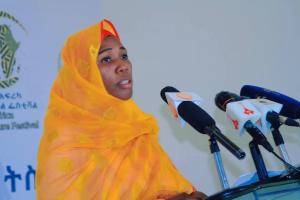

.jpg)
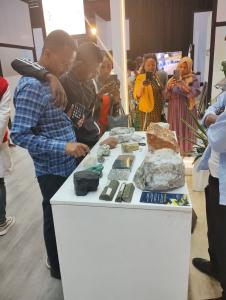
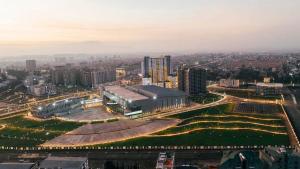
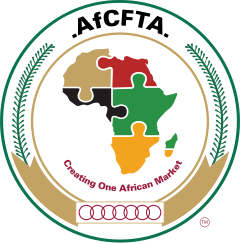

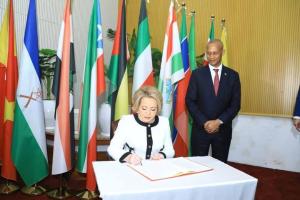

.jpg)
.jpg)


.png)
